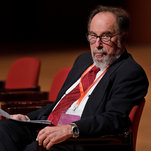David Baltimore, a celebrated molecular biologist and Nobel laureate, has passed away at the age of 87. His groundbreaking work in the field of virology reshaped our understanding of retroviruses, including the human immunodeficiency virus (H.I.V.), which has had a profound impact on public health and medical research.
Born in 1934, Baltimore’s scientific journey began at Swarthmore College, followed by further studies at the Massachusetts Institute of Technology (MIT). By the age of 37, he had made a pivotal discovery that challenged established biological concepts, particularly regarding how viruses interact with host cells.
Legacy of Innovation and Impact on Medicine
Baltimore’s research not only advanced the scientific community’s understanding of retroviruses but also paved the way for the development of life-saving treatments for H.I.V. His work demonstrated the intricate processes by which viruses can replicate and integrate into the genetic material of their host, significantly influencing both academic and clinical approaches to viral infections.
In recognition of his contributions, Baltimore was awarded the Nobel Prize in Physiology or Medicine in 1975, an honor he shared with fellow scientists Howard Temin and David Baltimore. Together, their research into the mechanisms of viral replication laid the groundwork for modern virology.
Throughout his career, Baltimore held numerous prestigious positions, including serving as the president of the California Institute of Technology (Caltech). He was also a prominent figure in various scientific committees, influencing policy and funding for biomedical research in the United States.
A Lasting Influence and Tributes
The announcement of his passing has prompted an outpouring of tributes from the scientific community. Colleagues and admirers remember him not just for his scientific achievements, but also for his mentorship and guidance to younger researchers. Baltimore’s ability to inspire future generations of scientists will leave a lasting legacy.
“David Baltimore was not just a brilliant scientist; he was a visionary who understood the broader implications of research on human health,” said Francis Collins, former director of the National Institutes of Health (NIH). “His contributions will resonate for decades to come.”
As the world reflects on Baltimore’s life and work, his influence can be seen in the ongoing efforts to combat viral diseases and improve public health outcomes globally. His passing marks the end of an era in molecular biology, but his discoveries will continue to inform and guide research in the years ahead.
